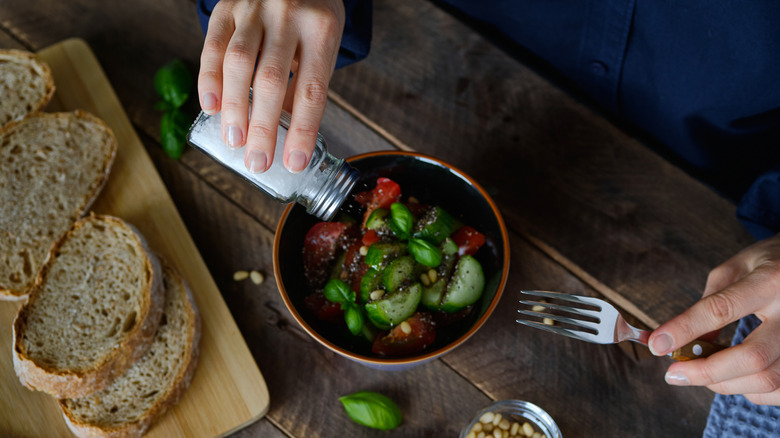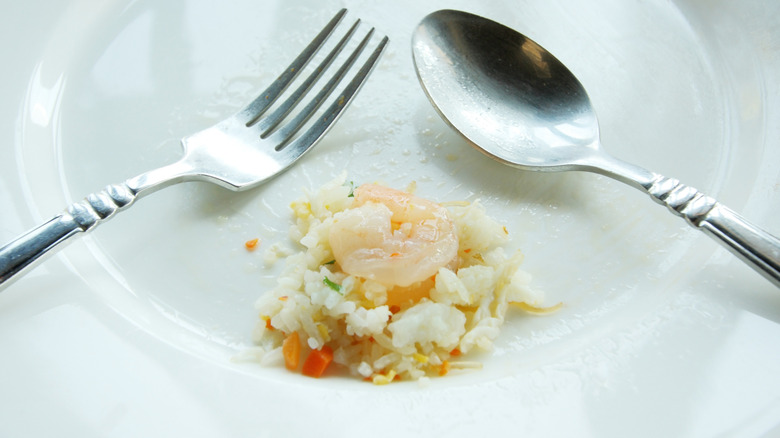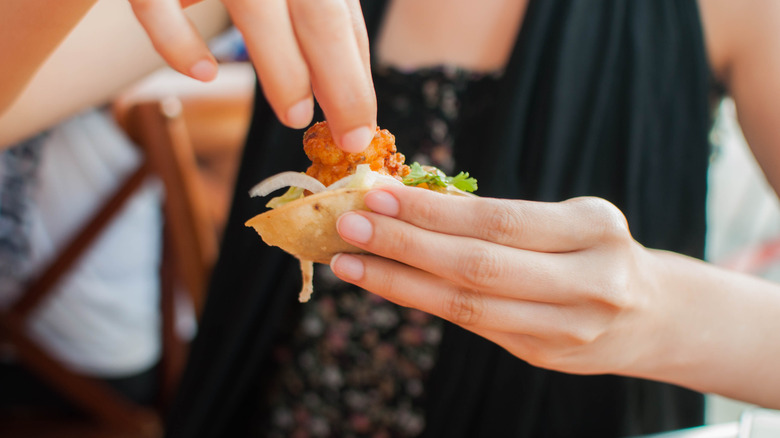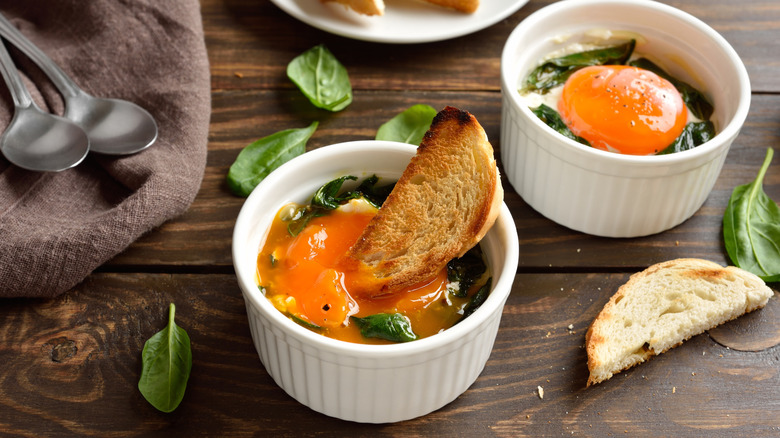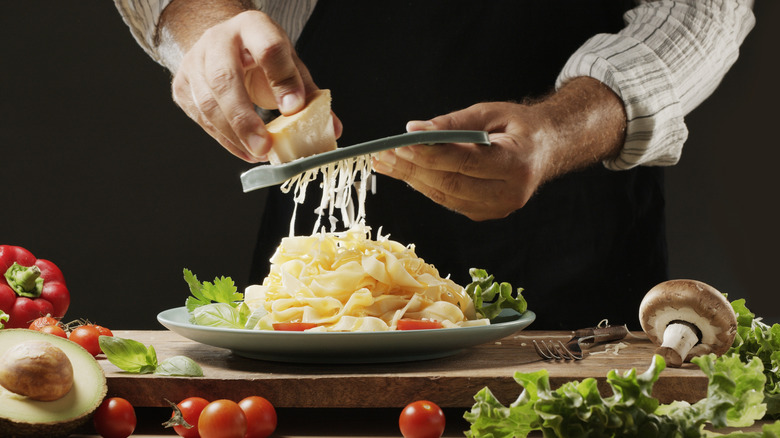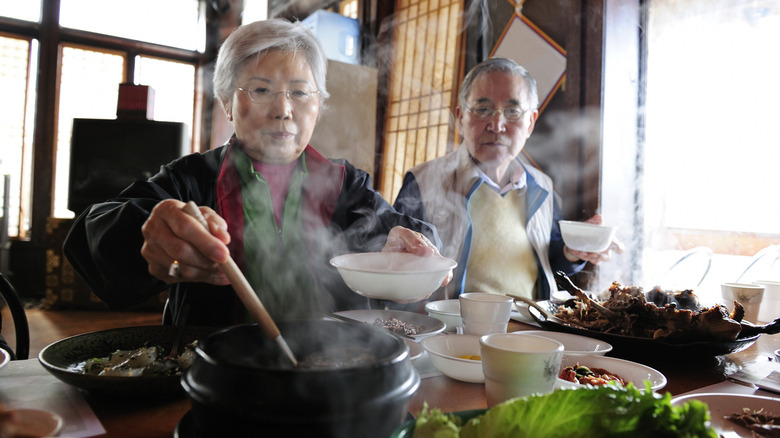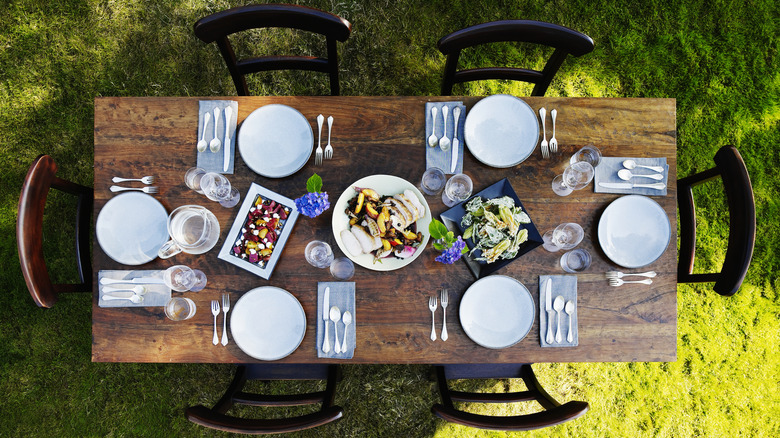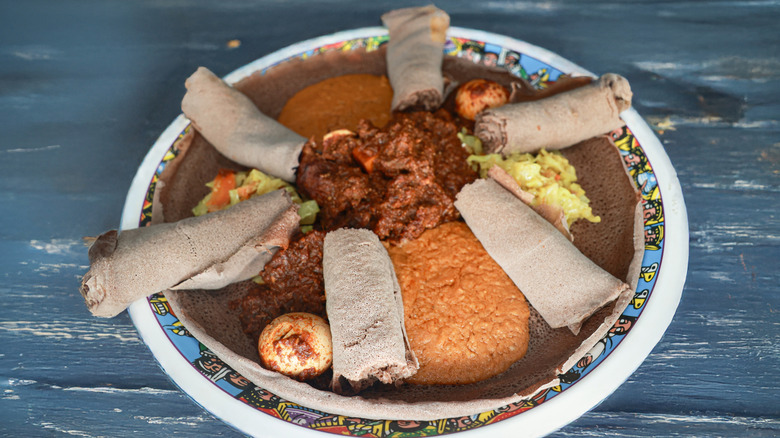13 International Dining Etiquette Rules We Should All Be Following
If you've ever traveled to another country and eaten with the locals, there's a likelihood you've run into some unfamiliar food customs. Sometimes, not knowing about them ahead of time can be pretty embarrassing. For example, eating with your left hand in India may garner unwanted stares, while knowing the proper chopstick etiquette when dining in China can save you from accidentally appearing rude. Just like it would be odd to eat a hamburger with a fork and knife in the U.S., other countries have implicit lists of dining dos and don'ts, and we're willing to bet you may have encountered some that you're dying to implement stateside.
Sure, the relatively relaxed dining etiquette of the U.S. may be a relief after being on your toes around food during a long trip, but sometimes having a set of unspoken rules is refreshing. It offers a baseline of politeness you can expect to enjoy during a meal, and even etiquette as simple as serving your elders first or leaving some food on your plate can give mealtimes a welcome structure. That being said, why shouldn't we apply some international customs to American cuisine? Even if impossible to do so on a national level, you could adopt some etiquette rules from other countries when eating at your own table — you may come to find family dinners all the more enjoyable for it.
In Portugal it's rude to ask for salt and pepper
Whether you went to Portugal to relax by the seaside, traipse around picturesque Alfama, or adventure to the Azores, there's little doubt you ended up tasting Portuguese cuisine along the way. The country is full of foods you have to try, and no trip to Portugal would be complete without at least one pastel de nata. Something you may have noticed about Portuguese food is that it's impeccably spiced and often full of flavor — you'd be hard-pressed to find a bland dish at any of the country's eateries. It's clear that the Portuguese take pride in their cuisine's flavors; as such, asking for salt and pepper is a huge no-no.
We get it — not everyone in the states is gifted in the art of seasoning, and as such, it's normal to have salt and pepper on the ready. But in Portugal, asking for some S&P indicates the food isn't seasoned enough, and is seen as incredibly insulting to the chef. You may have even encountered a version of this reaction stateside. Have you ever asked someone to pass the salt at a dinner party, only for the host to apologize for not seasoning it enough? Though you're unlikely to offend many in the U.S. with the simple request, refraining from asking for seasoning is a good Portuguese custom to keep in mind. At the very least, salt your dish while your host is looking the other way.
Don't finish all your food in China
How many of us grew up with parental admonishment for leaving food on the plate at the end of a meal? Reminders of the globe's starving children in tandem with pleas to finish your vegetables characterized the mealtimes of many a U.S. child. However, this is an American custom that would shock some of the world's citizens, and even be considered downright rude in other countries. For example, you should never clean your plate when dining in China.
It may seem an odd custom to us, but in China, it's perfectly normal (and even preferred) to leave at least a small portion of food on your plate at the end of the meal. The reasoning behind this custom is simple — finishing everything on your plate indicates that you haven't been served enough and may still be hungry, while leaving that last bite of food is a way to show that your host has given you an ample amount. It keeps your host from the awkward pondering of whether they should offer you more, and it allows the evening to flow into post-dinner activities more smoothly. Adopting this tradition in your family can give everyone a subtle way to indicate they're done eating — plus, it'll keep those kids with a smaller appetite happy.
Loudly slurp your soup in Japan
We'd be surprised if you haven't at least once had someone ask you to stop chewing so loudly, to chew with your mouth closed, or to quell whatever other noisy eating habit you may have. We're not sure why eating loudly is considered rude in the U.S. — perhaps it's simply that loud eating can be distracting from table conversation, or maybe you regularly dine with someone who suffers from misophonia. Regardless, eating quietly has become a pretty universal unspoken rule in the states, but in other countries, not making noise is one of the worst things you could do at the dinner table.
In Japan, for example, it's an insult not to slurp your soup. Slurping, though noisy, is a way of indicating that you're enjoying your soup, while eating it quietly can hint that you're unhappy with your meal. The cultural practice extends to noodles as well, so yes, you should absolutely slurp your soba noodles the next time you indulge in the Japanese meal. Your friends may not be the most pleased when you try to incorporate this rule into your dinner party habits, but we think it could grow on them. After all, slurping noodles will also allow you to experience all the flavor the dish has to offer.
It's frowned upon to eat with your hands in Chile
The U.S. plays host to a slew of handheld foods. In fact, many iconic American (or Americanized) favorites are meant to be eaten with your hands, like hamburgers, hot dogs, and pizza. Nobody will bat an eye here when you use your hands to eat, unless you're hand-spooning a dish like macaroni and cheese into your mouth. While it's far from a faux pas to dine on handheld foods in the U.S., in countries like Chile it would be tantamount to blasphemy.
You'll never see Chileans touch food with their hands for one simple reason: it's unhygienic. It's just considered a bit gross to eat with your hands, and honestly, this is a practice the U.S. should adopt with fervor. Is there anything more gnarly than playing an oft-used game of corn hole and then immediately diving into a cheeseburger? We don't think so, and Chileans probably don't, either. At the very least, wash your hands before touching food (yes, even at the annual Fourth of July barbecue) — or even better, choose to dine on foods that don't ask to be handheld in the first place.
The French use bread as a utensil
In all honesty, we wouldn't be surprised if you've already adopted this next custom, especially if you regularly indulge in a loaf of fresh bread. Even Americans are no stranger to sopping up leftover sauce with bread after finishing a bowl of spaghetti. Restaurants regularly serve baskets of bread before a meal, and a simple slice of toast is a breakfast staple. But the French take it one step further — in France, it's customary to use bread as you would use a utensil.
Rather than viewing bread as the vehicle for your leftover sauces, replace your fork (or spoon) with bread the next time you have it at a meal. Tear off a piece of bread and use it (alongside another utensil, if you must) to help the food get from the plate to your mouth. This tradition is a no-brainer addition to American culture — after all, who doesn't love bread? You'll want to adopt this cultural habit especially if you're a bread baker.
Italians never ask for extra cheese
If Olive Garden-goers have one great pleasure in life, it's likely the power rush that comes with the word "stop" once your waiter has grated enough cheese over your dish. Olive Garden servers won't stop grating until you give them the go-ahead, and there's no shame in letting them grate away — after all, the more (cheese) the merrier, right? Though asking for extra cheese is a common practice at the Italian-inspired chain, this is a practice you should never adopt if you visit its mother country.
As hard to believe as it may be, Italians will never ask for extra cheese on their meal unless it's offered. Just as it's rude to ask for salt and pepper in Portugal, it's also rude to ask for cheese in Italy, as it's considered insulting to the chef who has painstakingly prepared your food. This is one Italian pasta etiquette tip that, though it pains us to say so, should be adopted stateside. It's simply too easy to coat a meal in cheese such that all other flavors get drowned out. We get it, cheese is delicious, but sometimes less is more when it comes to the savory ingredient. Rather than asking for extra cheese, let the cheese already present in your dish shine in its own right and enhance the other flavors.
Don't eat off of your fork in Thailand
We know, we know, we just told you not to eat with your hands, and now we're telling you not to eat off of your fork. This Thai custom may seem strange, but it's really not as limiting as you might think. See, forks are still used in Thailand, but they're typically employed along with a spoon. Rather than placing a forkful of food straight into your mouth, the Thai use forks to guide food onto the spoon before eating it.
It sounds a bit weird, but it makes sense if you think about it. After all, while the concave base of spoons are made for holding food, forks really aren't — how many times have you had food fall off your fork on its way to your mouth? Even though it might feel uncomfortable at first not to eat with a fork, we think this is a practice we should implement wholeheartedly, even if simply because it will make you a less messy eater.
South Koreans serve their elders first
Feeding frenzies aren't all that uncommon at the American dinner table. Whether you serve your meals buffet- or family-style, there's regularly a horde of hungry mouths eagerly anticipating filling their plates, and you may be so used to disorder at the dinner table that you hardly even notice it anymore. Maybe mom serves the kids first and nearly forgets to grab a plate for herself. There's one country where you're unlikely to see family members scrambling for first dibs on hot dishes: South Korea.
Here there's one simple implicit dining practice that we should absolutely be practicing stateside — the elders lead the meal. This means that elder members of the family will sit first, get served first, and even start eating first, before the rest of the family follows suit. It's a simple gesture of respect for your elders, who are considered to have the highest social rank in South Korean culture. So the next time you have your grandparents over for dinner, serve them first as a display of how much you love and value them.
Hungarians never clink their glasses together
It's relatively common for a party to clink their glasses together and say "Cheers!" before digging into the food on their plates. In fact, toasting your drinks is a common practice in various countries around the world, and can feel like a way to stay somewhat connected to our global brothers and sisters. However, there is one country in which you should be wary of clinking your drinks in this manner. Hungarians commonly eschew toasting due to a traumatic event in the country's history.
When the Austrians quelled the Hungarian revolution in the 1800s, they are said to have celebrated by clinking their glasses together in a toast. After that, Hungarians declared not to cheers in such a manner, and though it's not an outright social faux pas to do so, you'd be hard-pressed to find the practice commonly exhibited around the country. Why should we adopt this habit given that we don't have a similar cultural history? This would be a good post-COVID hygiene measure, and it could also save you (or your server) from having to clean up toasting-induced table spills.
In Argentina, don't sit until the host shows you your seat
You may already be practicing a version of this next cultural tradition without knowing it. In your household, does everyone have a particular spot they sit at around the dinner table each night? Maybe they've been assigned, or maybe you've just fallen into a pattern over the years. Regardless, everyone has a certain place at the table — as is the case if you attend a dinner party in Argentina.
In fact, in Argentina, you shouldn't simply choose your own seat — your host will show you to your seat, even on informal occasions. You should also wait for your host before taking a sip of your drink or starting to eat; you can do both once your host has begun. This habit is polite and helps bring order to a dinner, and your host may have reasons for wanting you to occupy one seat and not another. For example, Ina Garten's seating hack suggests that the two most talkative people should be in the middle of the table to help the rest of the party engage in conversation.
Ethiopians eat off of communal plates
In the U.S., it's a huge faux pas to eat off of your date's plate without them first offering you a bite (no matter how amazing their dinner looks). Many an American couple's argument has started over territorial food disputes unless you're dining buffet-style, and we get it — you want to enjoy what you ordered. But what if we told you that another country has the exact opposite practice. In Ethiopia, it's strange not to eat off of the same plate.
Expecting your own plate of food is a mistake not to make when you go to an Ethiopian restaurant. Using multiple plates is seen as being wasteful — after all, why should you have several small plates when guests can all eat off of one large plate in the middle of the table? We love the idea of adopting this practice, not only because it's less wasteful, but also because it embodies a sense of community when you share a meal with loved ones in this way. Just don't be selfish, and be careful not to double dip.
Russians always accept drinks they're offered
So you're over at your friend's house and they offer you a glass of chardonnay. What do you say? It's not uncommon to think there are no rules here — it's polite to say yes, but you can always say no if you don't want it, with little fear of offending your host. While this is widely acceptable in American culture, declining a drink is seen as incredibly rude in other countries — namely Russia.
If you're ever offered a drink in Russia, you should absolutely take it. Accepting a drink is a sign of friendship, and there's a decent chance your host will feel slighted if you decline. In fact, Russia has a ton of drinking customs — for example, the proper etiquette when making a toast in Russia is to drink at least half of your shot each time you toast. Why should we adopt this one? Accepting a drink is a way to form an instant connection between you, your host, and others at the party who are also partaking, as it's a practice you're all engaging in together. Of course, you should always do so at your own discretion.
Adopt the Oxford tradition of sconcing
This particular dining etiquette rule is more fun than the others, and could be an exciting new practice to enjoy the next time you're out at a bar with friends. If you're at all familiar with Oxford University, you may have heard of the tradition of "sconcing." Sconcing is a simple, fun way to ensure everyone at your party is on their best behavior — whenever anyone breaks an etiquette rule at dinner, they must drink a certain amount of alcohol.
While this isn't a tip we would want anyone to take too seriously, it can be a fun way to introduce your friends to some of the other cultural traditions on this list at your next dinner party. Whenever someone slips up, sconce them! In the University spirit, keep sconcing a fun, lighthearted practice to get the most enjoyment out of it. Now go and implement all the dining traditions you want to, and feel free to sconce anyone who doesn't follow along.

